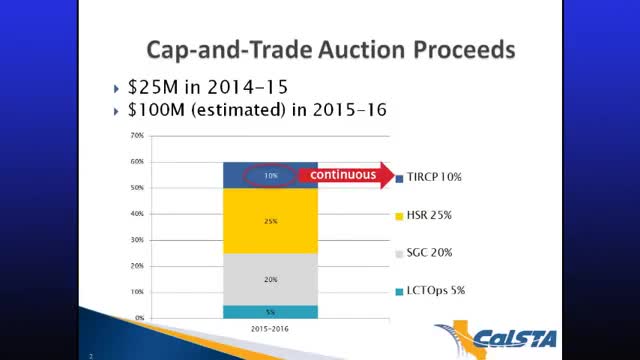State outlines draft guidelines, schedule for Transit and Intercity Rail Capital Program; operators request flexibility for projects with awarded contracts

Summary
CalSTA presented draft guidelines and a proposed schedule for the Transit and Intercity Rail Capital Program using cap‑and‑trade proceeds; regional agencies asked that projects that have advertised or awarded contracts remain eligible and requested ability to submit multiple applications.
Agency staff presented draft guidelines and a timeline for the Transit and Intercity Rail Capital Program, funded in part by cap‑and‑trade auction proceeds, and described an initial two‑year call for projects and selection criteria focused on greenhouse gas reductions, ridership increases and integration with other operators.
CalSTA staff said the program would use $25 million appropriated in 2014‑15 plus a 10% continuous appropriation beginning in fiscal year 2015‑16; the administration's budget estimated approximately $100 million for 2015‑16, producing a working estimate of $125 million for the initial two‑year call. The draft schedule calls for guidelines adoption in early February, a call for projects on February 9, applications due April 10, and a recommended project list to return to the commission by August 26.
Eligible applicants include a wide range of public agencies and JPAs operating or planning regularly scheduled service (inner city rail, commuter rail and bus, and rail and bus transit services). Projects must demonstrate greenhouse gas reductions; selection criteria prioritize statutory objectives (GHG reduction, ridership, integration, safety) and secondary criteria such as benefits to disadvantaged communities and geographic equity. Staff said they expect to select a small number of transformational projects, asked agencies to limit submittals to one major and one smaller project, and proposed that no single project receive more than one‑third of available funding.
Regional agencies — Metropolitan Transportation Commission, LA Metro and SFMTA — urged the agency to allow projects that have already advertised or awarded contracts to remain eligible and to enable multiyear commitments or letters of no prejudice to support large transformational projects. MTC asked that multi‑year commitments (for example, full funding grant agreement‑type arrangements) be allowed; SFMTA explained it had awarded a light‑rail vehicle contract and sought to preserve eligibility for an option the agency planned to exercise imminently so as not to lose production line position.
Staff said the program must demonstrate net greenhouse gas reductions and expressed concern about funding projects already fully funded in ways that would not clearly demonstrate incremental GHG benefit. Staff also described application requirements (scope, schedule, cost), expectations for operations and maintenance funding for ongoing projects, and consideration of project readiness and risk, including ability to absorb cost overruns. The program includes substantial recipient reporting requirements developed by ARB.
No formal action was taken; the item was an information presentation and staff invited written comments by January 31 and noted planned guideline adoption on February 6 and subsequent call for projects.

